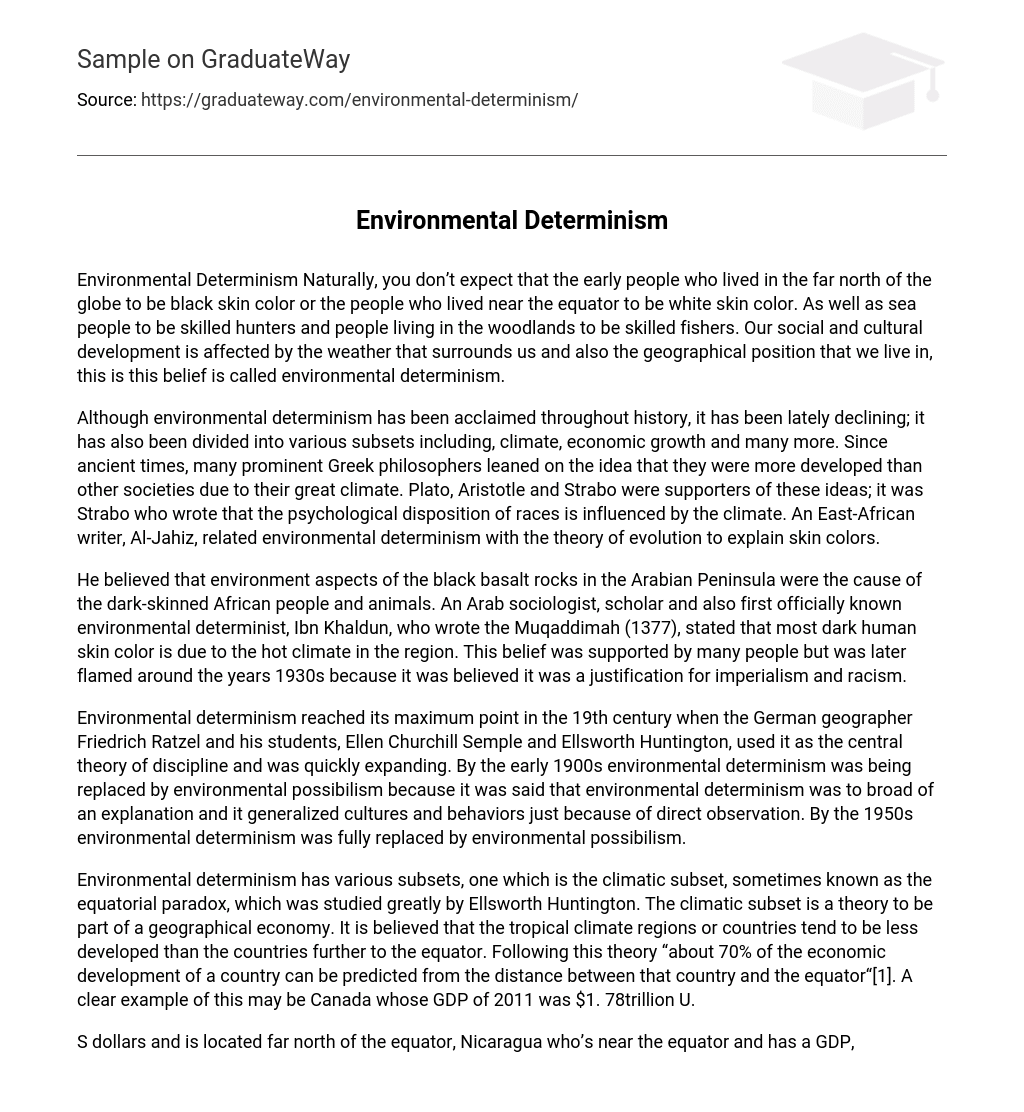Environmental Determinism Naturally, you don’t expect that the early people who lived in the far north of the globe to be black skin color or the people who lived near the equator to be white skin color. As well as sea people to be skilled hunters and people living in the woodlands to be skilled fishers. Our social and cultural development is affected by the weather that surrounds us and also the geographical position that we live in, this is this belief is called environmental determinism.
Although environmental determinism has been acclaimed throughout history, it has been lately declining; it has also been divided into various subsets including, climate, economic growth and many more. Since ancient times, many prominent Greek philosophers leaned on the idea that they were more developed than other societies due to their great climate. Plato, Aristotle and Strabo were supporters of these ideas; it was Strabo who wrote that the psychological disposition of races is influenced by the climate. An East-African writer, Al-Jahiz, related environmental determinism with the theory of evolution to explain skin colors.
He believed that environment aspects of the black basalt rocks in the Arabian Peninsula were the cause of the dark-skinned African people and animals. An Arab sociologist, scholar and also first officially known environmental determinist, Ibn Khaldun, who wrote the Muqaddimah (1377), stated that most dark human skin color is due to the hot climate in the region. This belief was supported by many people but was later flamed around the years 1930s because it was believed it was a justification for imperialism and racism.
Environmental determinism reached its maximum point in the 19th century when the German geographer Friedrich Ratzel and his students, Ellen Churchill Semple and Ellsworth Huntington, used it as the central theory of discipline and was quickly expanding. By the early 1900s environmental determinism was being replaced by environmental possibilism because it was said that environmental determinism was to broad of an explanation and it generalized cultures and behaviors just because of direct observation. By the 1950s environmental determinism was fully replaced by environmental possibilism.
Environmental determinism has various subsets, one which is the climatic subset, sometimes known as the equatorial paradox, which was studied greatly by Ellsworth Huntington. The climatic subset is a theory to be part of a geographical economy. It is believed that the tropical climate regions or countries tend to be less developed than the countries further to the equator. Following this theory “about 70% of the economic development of a country can be predicted from the distance between that country and the equator“[1]. A clear example of this may be Canada whose GDP of 2011 was $1. 78trillion U.
S dollars and is located far north of the equator, Nicaragua who’s near the equator and has a GDP, as of 2011, of $7. 3billion U. S dollars. Also, Chile who is southern more of the equator has a GDP of $248. 59billion U. S Dollars as of 2011 as well [2]. This theory has counter-examples due to high investments done within the country and also resources such as oil, fish, wood, and many more. Another subset of environmental determinism is the economic growth. Geography is a great influence in the economic growth because people usually tend to move to more productive areas where you tend to have easier access to resources.
Usually, countries that have a vast access to fresh water, aren’t land locked, have great climate, good soil, good route access and are closer to the sea, tend to be the most prosperous. Of course this may change depending of what kind of resources you have, some desert countries tend to have oil and become and exception. Environmental determinism has shown a great impact of culture. People who are used to live near the tropical sea tend to eat a lot of fish food, usually know how to swim and according to a Jamaican stereotype, they are more relaxed.
People who live in the snow or really intense cold weather are usually more depressed, slow, have higher rates of suicides and mostly, and have more tendency for hot drinks. Finnish and Russians have a vodka drinking stereotype, meanwhile tropical climate countries like Nicaragua and Puerto Rico are usually more into rum. We also have Chile and France who have a chilly weather and tend to drink more wine. Environmental determinism has been around for ages, it has slowly been fading away since new theories are coming up and many exceptions and showing.
Many famous philosophers, geographers, scientists and even writers support the idea of environmental determinism, which can be related to the theory of evolution and can be an explanation of the different skin colors that not only us, humans, have developed but also many other types of animals in different regions. Environmental determinism can be used to determine about 70% of a country’s economy because you can tell by the geographical position of the country if it’s land locked, has fresh water access and also vast resources.
Cultures are formed around environmental determinism; Nicaraguans, for example, tend drink mostly rum since it’s easy to produce in this weather and they are used of it. Also, it may be normal for Canadians to eat lots of fish and salmons because they are cheaper there and so they make typical food out of them but in the Middle East, this may be totally different for them because they are not used to these types of food since it isn’t part of their environment. Quotations [1] http://neohumanism. org/c/cl/climatic_determinism. tml [2] world bank Sources http://en. wikipedia. org/wiki/Environmental_determinism#History http://en. wikipedia. org/wiki/Muqaddimah http://geography. about. com/od/culturalgeography/a/envdeterminism. htm http://www. studymode. com/essays/Environmental-Determinism-462306. html http://www. laphamsquarterly. org/voices-in-time/environmental-determinism. php? page=all http://neohumanism. org/c/cl/climatic_determinism. html http://www. britannica. com/EBchecked/topic/189178/environmental-determinism





